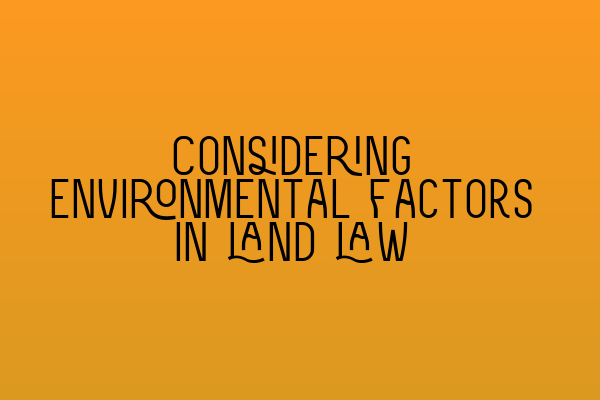Considering Environmental Factors in Land Law
In recent years, the impact of environmental factors on land law has become increasingly significant. With the growing concerns about climate change, pollution, and sustainability, it is crucial for property law practitioners to consider these environmental factors when dealing with land transactions and disputes. This blog post will explore the importance of considering environmental factors in land law and provide insights into how solicitors can navigate this evolving landscape.
One of the key environmental factors to consider in land law is the impact on ecosystems and natural resources. Land transactions and development projects can have a profound effect on the surrounding environment, including air quality, water bodies, and biodiversity. It is critical for solicitors to assess the potential environmental risks associated with a particular piece of land and advise their clients accordingly.
For example, when reviewing a property for potential development, solicitors should consider whether there are any protected species or habitats on the land. This information can help clients make informed decisions and take necessary actions to comply with environmental regulations. By undertaking thorough environmental due diligence, solicitors can identify any potential risks or liabilities and guide their clients in mitigating them.
Moreover, sustainability has become a key focus in land law. Clients are increasingly interested in incorporating environmentally-friendly practices into their land transactions and development plans. Solicitors can assist their clients by advising on sustainable building materials, energy-efficient designs, and renewable energy sources. By doing so, solicitors can help clients reduce their carbon footprint and contribute to a more sustainable future.
In addition to the legal implications, considering environmental factors in land law can also have financial benefits for clients. For instance, properties with green certifications or eco-friendly features can command higher prices in the real estate market. By being knowledgeable about environmental factors in land law and helping clients adopt sustainable practices, solicitors can add value to their services and enhance their clients’ overall investment.
It is important for solicitors to keep themselves updated with the latest developments in environmental legislation and regulations. The body of law governing environmental protection is constantly evolving, and compliance is crucial for both individuals and businesses. Staying informed about new requirements and advising clients accordingly can help solicitors avoid potential legal issues and reputational damage.
To ensure a comprehensive understanding of environmental factors in land law, solicitors should consider undergoing specialized training and professional development courses. Organizations like SQE Property Law & Land Law offer preparation courses that cover relevant topics, including environmental considerations in land transactions. These courses can equip solicitors with the necessary knowledge and expertise to provide comprehensive advice to their clients.
In conclusion, the consideration of environmental factors in land law has become of paramount importance in today’s legal landscape. Solicitors need to be proactive in assessing the environmental implications of land transactions and development projects, as well as advising clients on sustainable practices. By doing so, solicitors can contribute to environmental protection, add value to their services, and stay ahead in a rapidly evolving field.
For more resources and information on SQE exams and preparation, check out the following articles:
– SQE 1 Practice Exam Questions
– SQE 1 Practice Mocks FLK1 FLK2
– SQE 2 Preparation Courses
– SQE 1 Preparation Courses
– SRA SQE Exam Dates
Remember, staying informed and continuously updating your knowledge is vital to success in the legal profession.
